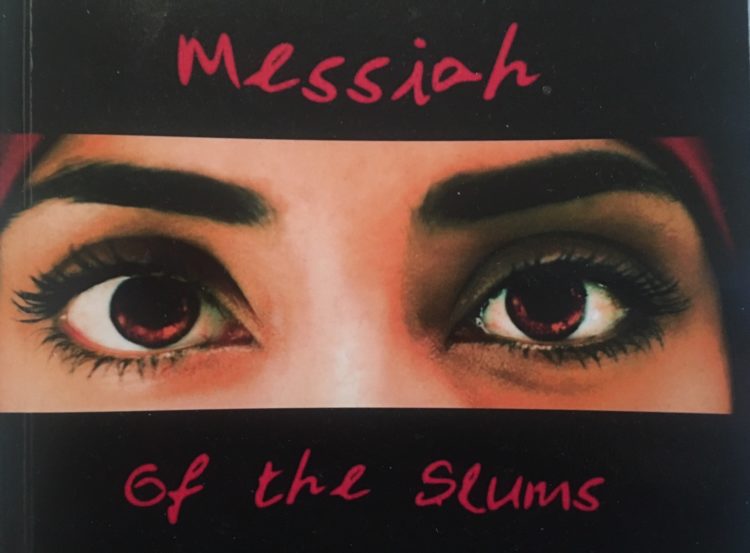Crime, poverty, Islam – Liverpool author who is tackling the big issues of our time
Catherine Harrison has worked as a schoolteacher, pianist in a bar and a private music tutor and her debut novel about a messianic figure emerging on a Liverpool sink estate is described as ‘brutal and compelling’. Tony McDonough reports

For many of us having a talent just for one thing is enough and how many secretly despised the other kids who just seemed to be good at everything?
The piano and guitars in Catherine Harrison’s front room are testament to her musical talent… and it doesn’t stop there.
As well as being a performer, music teacher and having a stage adaptation of Shakespeare’s Richard III under her belt, Catherine is a published novelist, writing under the pen name of Charlotte Pickering.
Her debut novel, Messiah of the Slums, was originally published in 2014 and is now being published as a second, edition, to include a Foreword by former chair of the Booker Prize committee, the late Sir Gerald Kaufman, and Afterword by Cambridge academic, author and former Archbishop of Canterbury, Rowan Williams.
Dark themes
Set in the fictional Liverpool sink estate, of Shriveton, the book tackles some pretty meaty themes – crime, drugs, urban deprivation and the perception of Islam in the UK.
Shriveton is controlled by a drug lord called Incubo and, according to the blurb, “corrupt law enforcement, endemic unemployment and social fragmentation have made it a fertile land for unfettered criminality”.
Incubo recruits boys of primary school age and turns them into his “soldiers” who work in his enterprise and enable him enforce his will on the cowed and demoralised local populace.
The hero of this tale is a mysterious young Muslim woman who is “defiant in the face of the evil all around” and is seen as “a friend of the friendless, healer of the sick, priestess, saint, lover, saviour and god incarnate”.
She sparks a “revolution” in Shriveton and her presence turns out to be a catalyst that fundamentally changes the lives of everyone around her.
Reality of life
Catherine says Shriveton is based on a real modern day sink estates. No less than the former Archbishop of Canterbury, Dr Rowan Williams, has written a foreword for the book in which he says it is an accurate depiction of places he himself had lived and worked in.
“Shriveton is dystopian, in some ways, and it is also very real,” said Catherine. “It is based on things I have seen and experienced first-hand in impoverished places where where ‘hope’ can be little more than something in a song lyric.”
Divine inspiration
She says the choice of a Muslim woman as the hero of the novel was a deliberate one.
“The idea came from when I was at a low point in my life. I had been talking to a person called Andrew Buchanan. He is an Anglican priest and was really kind and helpful to me,” Catherine added.
“We talked about how Christ was someone who was a complete outsider in within the society in which he lived. He was the most improbable messiah.

“I remember just walking around thinking ‘who would be the most unlikely messiah?’ if there was to be another. And I came up with a Muslim woman.
“Messiah of the Slums is a retelling of the Christian story in a non-religious, modern day context. Even if you are not particularly religious – and I have a lot of agnosticism in me – I think as a story people will find it quite compelling.”
Love of books
Brought up in Merseyside, Catherine was fascinated by literature from an early age. Her gateway drug was the novels of Agatha Christie and it was Emily Bronte’s classic novel Wuthering Heights which really lit the literary flame.
An English literature graduate, her working life has veered equally between music and words, earning a living as a schoolteacher, writing articles and press releases, playing in bands and even working as a pianist in a bar.
She is also Licentiate of London College Music and completed an Open University Diploma in Music plus post grad (PGCE) at the University of Liverpool.
Her adaptation of Richard III was performed at the Theatre Clywd and Edinburgh Fringe last year and she has now produced a condensed, hour-long version of Macbeth, soon to be showcased at the same venue.
She currently earns her main living as a music teacher, director and producer, saying: “I have always been involved in drama and the arts, pedagogically and practically.

“I had always wanted to write a novel. I actually did write one in my early 20s and that was picked up by an agent. But then I had kids and moved away from it.”
In the flow
Writing is an unfulfilled ambition for many people and Catherine offers an insight into her own processes and methodology.
She explained: “I do lots of and lots of thinking, noting ideas down, and doing lots and lots of thinking again. I am always cutting back, losing as many words as I can lose. Then I bring in pilot readers who can be objective and I do loads and loads of research.
“When I get in a flow an idea will come along. It comes from outside me and it is a very strange feeling. There were lots of very strange happenings around the whole book.”
One such happening concerned a short promotional film for Messiah of the Slums. Finding someone to depict the hero proved a challenge.
“I was in touch with lots of actors but couldn’t find the right person – she had to be small, had to be very petite and very beautiful,” said Catherine.
“I opened the door one day and this woman was standing on my doorstep. It was a person called Samir Orm. She was a Muslim woman and a model.
“She had brought her son for a piano lesson with my son, who also teaches. I kept staring at her so she must have thought I was a bit weird. But she agreed to play the character for the film.”
New project
Catherine is currently studying for a doctorate in English literature at Bangor, which she intends to turn into her second book – a non-fiction work called The Character of Evil, which explores evil literary protagonists from Tudor times to the Holocaust.
Music will remain a major part of her life and work. She also runs a charity band called Soundwall.
Maintaining the “flow” of writing and research while dealing with the demands of everyday work and life can be a challenge, she admits, but is determined to keep up the momentum.
She said: “I suppose that I always had that yearning to put pen to paper… Literature is life so who isn’t interested in that?”
